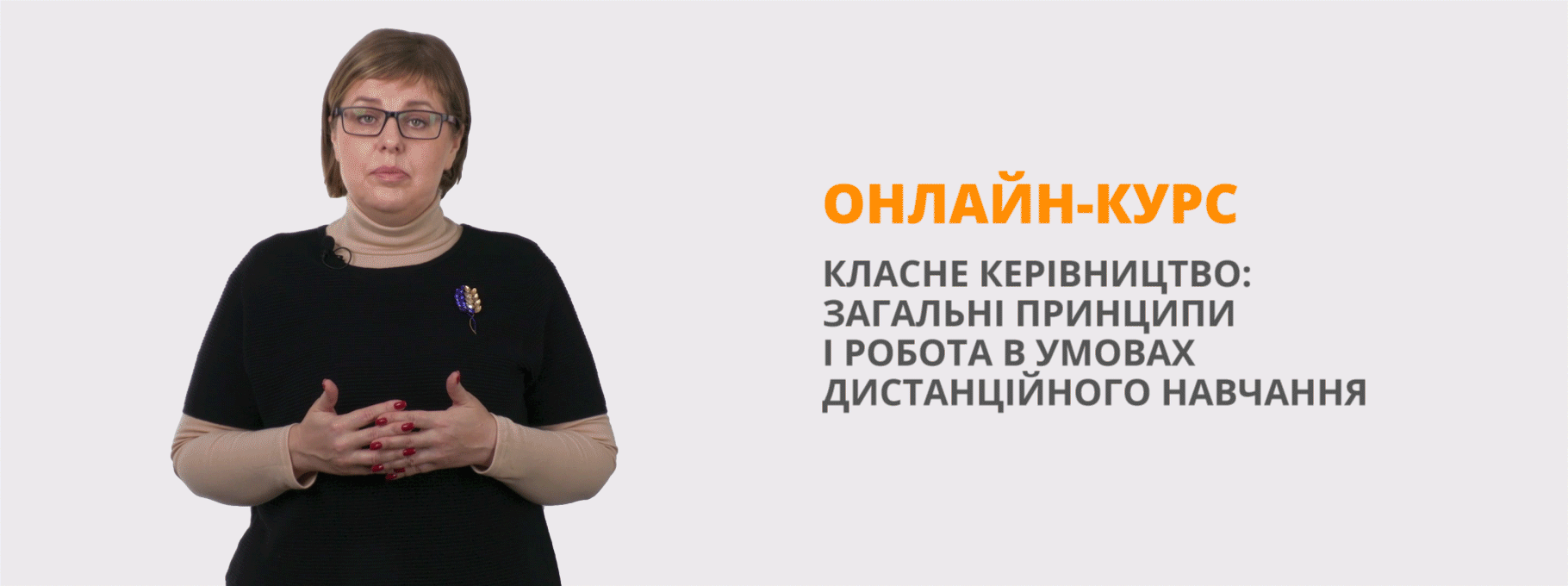Урок на тему "Planning the School Newspaper"
УРОК-ЗАХИСТ ПРОЕКТУ
Topic: Planning the School Newspaper
LEVEL: A-2+ PRE-INTERMEDIATE
Objectives:
- to motivate learners to free speaking, exchanging opinions and developing skills of group discussion;
- to help students understand the importance of press;
- to discover cultural and moral values through varied creative classroom activities;
- to expand students’ vocabulary.
Learning outcomes:
At the end of the lesson learners will be able to:
- to recognize, understand the words, word-combinations when reading the text;
- to identify the main ideas and details of the text when reading;
- to develop students’ discussion skills;
- to activate background knowledge of the topic;
- to improve students’ confidence as readers;
Equipment: SB Nesvit A. English,8, computer, handouts, pencils, printer, glue, pictures.
PROCEDURE OF THE LESSON
I.INTRODUCTION
1.Greeting. Introduction of new topic and warming-up:
T: God morning pupils! How are you? I hope you are well and in a good mood to start our lesson. Modern life is so fast and changeable! Could you name me several important things without which you can’t imagine your life? First of all, pay your attention at the screen. What are we going to talk about? Share your ideas!
Students’ answers:
- Famous singers
- Fashion
- Magazines
- Newspapers
- Journals
- Sport stars
- Actors
T: Thanks a lot, so today we are going to have a lesson devoted to the world of Mass Media. People have always wanted to be well-informed in current events. They used to read books, newspapers and magazines. Mark Twain said: ''There only two forces that can carry light to all corners of the globe – the sun in the heavens and the Associated Press''. So during the lesson we'll talk about the press and Mass Media.
Brainstorming (microphone)
T: Dear students! Do you want to be well-educated people, to study at the universities in Kyiv, Kharkiv or maybe even abroad?
Do you want to get a good well-paid job?
In order to be successful you must be able to find necessary information from different Mass Media sources. What association does come across to your mind when you hear the words ''Mass Media''? Answer to my question, using the vocabularies and this microphone.
Mind-Map
Newspapers The Internet TV
Mobile phones The Media Radio
Books Magazines Web-based
T: Take yours copy-books and pens, choose some words, key-words and write your associations down.
The examples of the students' answers:
S1: I associate the Media with the Internet.
S2: I associate the Mass Media with the magazines.
II. MAIN PART
1. Speaking
T: How do you understand the word “mass media”?
T: The mass media consists of publishing, audio recording, broadcasting, films and digital media.
What do you know about publishing?
S: Publishing is divided into magazines, books and newspapers. Magazines are one of the basic mass media. You can choose any magazine according to your interests. There are many kinds of them: about sports, cookery, fashion, cars, nature, fishing.
T: The ancient mass media are books, do you agree with me?
S: As I know many years ago books were written by hand. Ivan Fedorov began to print books in Russia in the 15th century. Printing opened the new world of thoughts and knowledge that changed the lives of millions everywhere. Now we have a lot of books in libraries, in shops and at home. There are many kinds of books: novels, poems, dictionaries, encyclopedias, adventures, thrillers, detective stories, horror stories, science fiction and etc. Many of them are interesting, appealing and creative. They make people laugh, think, and invent new things.
T: What do you think about newspapers? Are they important nowadays?
S: Yes, they are. All the newspapers can be divided into two groups: quality (broadsheet) papers and popular (tabloid) papers.
T: Study the following table of the British newspapers and say what newspaper you’d favour and why.
|
Title |
Established |
Circulation |
Political party at the election |
|
The Sun (p) |
1964 |
4,055,333 |
Conservative |
|
The Mirror (r) |
1903 |
3,096,421 |
Labour |
|
Daily Mail (p) |
1896 |
1,809,751 |
Conservative |
|
Daily Star (p) |
1978 |
1,136,840 |
Conservative |
|
Daily Express (p) |
1900 |
1,136,840 |
Conservative |
|
Today (p) |
1986 |
339,705 |
Liberal/SDP |
|
Daily Telegraph (p) |
1885 |
1,169,406 |
Conservative |
|
The Guardian (s) |
1821 |
460,340 |
Liberal/SDP |
|
The Times (s) |
1785 |
447,248 |
Conservative |
|
The Independent (s) |
1986 |
360,887 |
None |
|
Financial Times (s) |
1888 |
227,525 |
Conservative |
p – popular with many pictures;
s– serious, vocabulary more difficult;
r – a bigger but similar newspaper is available on Sunday.
T: There’s another opinion on the English press.
The Financial Times is read by the people who own the country.
The Times is read by the people who run the country.
The Daily Mail is read by the wives of the people who run the country.
The Daily Mirror is read by the people who think they run the country.
The Guardian is read by the people who think they ought to run the country.
The Sun is read by the people who do not care who runs the country so long as they have beautiful smiles, long legs and big chests.
T: Now let’s take the newspapers which are on your desks and look through them carefully. First find and say:
- newspaper’s logo and title;
- the date of publication;
- what the newspaper’s number is;
- a newspaper index;
- the price;
- the headline;
- which article is the longest (the shortest) in today’s newspaper;
- select current news events that you can relate to some historical events;
- a photo;
- the reporter’s name.
(Students are working).
T: Local news is of a particular interest. Advertisements in local papers from shops and traders in your own home district have some effect on your spending. Almost every town has its own local paper. The job of the editor of a local newspaper is to publish a paper that lots of people will want to buy. Share the roles and follow the recommendations given bellow.
2.Role-playing
T: Now we’ll design a school newspaper. Share the roles. Follow the recommendations given bellow (ex.1, p.29 in SB).
People in the Newspaper
E d I t o r (s)-in-C h i e f
Responsibilities include designing a layout of a newspaper and deciding what stories to run, where to place them, etc.
C o p y E d i t o r s
Responsibilities include proofreading stories for spelling, grammar and punctuation, and writing headlines.
J o u r n a l i s t s
Responsibilities include collecting information, taking interviews, writing stories and headlines.
A r t D e s i g n e r s
Responsibilities include drawing pictures, designing pages, etc.
P h o t o g r a p h e r s
Responsibilities include taking and printing pictures, searching for necessary pictures on the Internet.
T: Your hometask for today was to prepare some interesting material to make a wall newspaper. Have you done it? OK! If you feel strongly about something, you can write to a newspaper about it. Read these pieces of advice and begin making a newspaper.
(Students are making a wall newspaper)
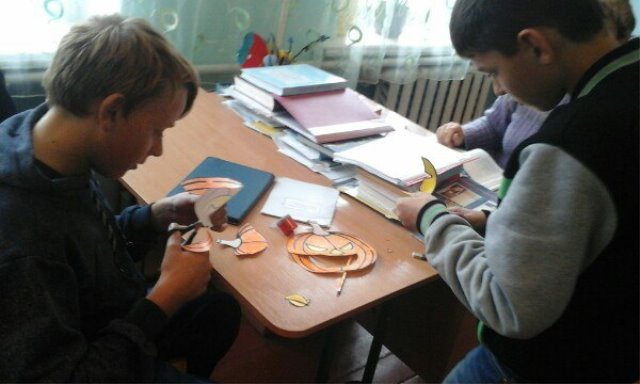
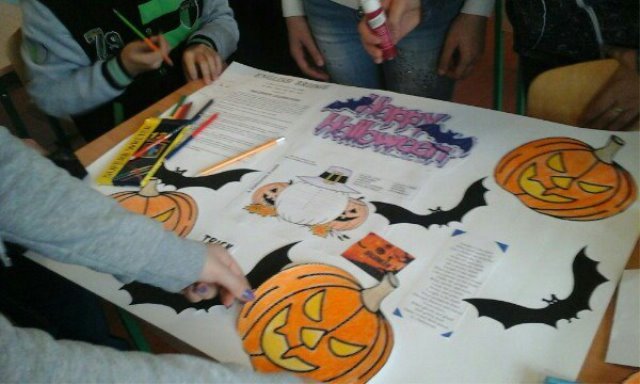
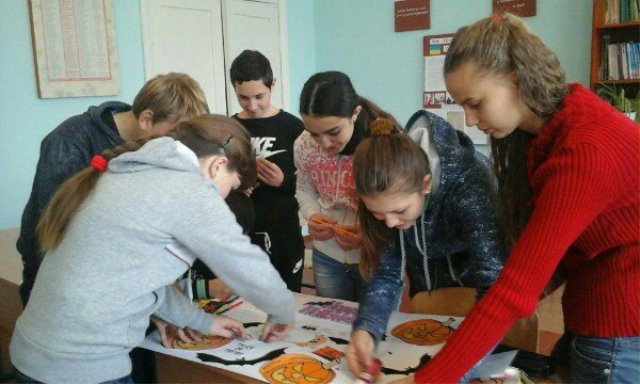
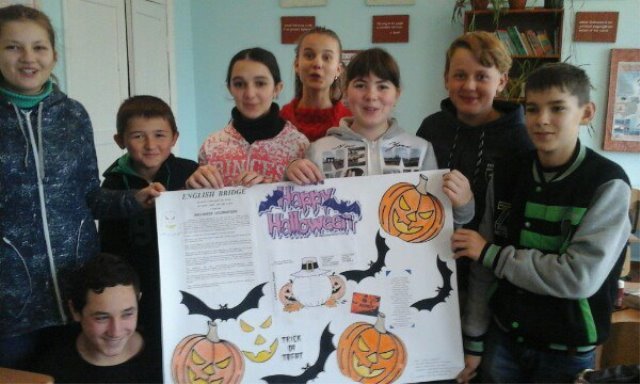
IV. Homework.
T: Write a letter to your English-speaking friend about the press in Ukraine and about your own wall newspaper. Did you like today’s lesson?
V. Summarizing.
T: Well, our lesson is coming up to the end, and it's time to make a conclusion.
We have discussed the information about the Mass Media, presented the project.
We've made different kinds of activities.
We've put each other the questions and answered them.
We've corrected mistakes.
We've worked with vocabulary, read the texts.
We've spoken perfect English.
We've enjoyed our making newspaper together.
As for your today's achievements, they are not bad. You have worked so hard, you have done your best. Your marks are very good and excellent.
Thank you for the lesson, it was nice to work with you today.
Good bye! Enjoy your rest!


про публікацію авторської розробки
Додати розробку
